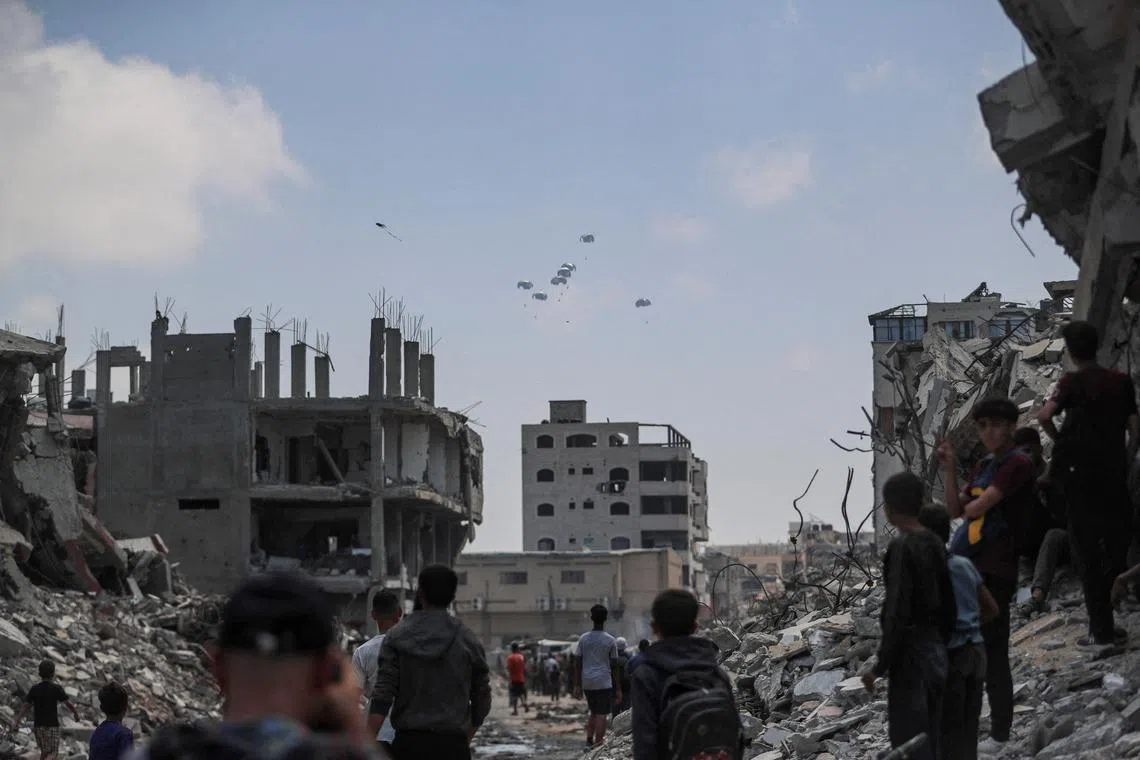Israel’s Gaza City offensive may be weeks away, leaving time for ceasefire
Sign up now: Get ST's newsletters delivered to your inbox

Palestinians looking at aid packages being airdropped over Gaza, in Gaza City, on Aug 8.
PHOTO: REUTERS
JERUSALEM – Israel’s new offensive in Gaza City could take weeks to start, leaving the door open for a ceasefire, officials say, even as Israeli Prime Minister Benjamin Netanyahu said it would get under way “fairly quickly” and end the war with Hamas’ defeat.
Two officials who were at a security Cabinet meeting on Aug 7 to approve the plan told Reuters that the evacuation of civilians from affected areas may be completed only by the start of October, giving time for a deal to be pursued.
The plan raised international alarm over the harm it could bring to the shattered enclave, where a hunger crisis has worsened.
On Aug 10, Mr Netanyahu summoned foreign journalists to explain the blueprint, which includes what he described as a surge of humanitarian aid.
He said Israel will first allow civilians to leave the battle zones before forces move in on Gaza City, which he described as one of Hamas’ last two remaining strongholds and whose defeat will bring an end to the war.
But Israeli Finance Minister Bezalel Smotrich, a security Cabinet member who has demanded even tougher action, said the plan was designed to pressure Hamas back to the negotiating table, rather than defeat the group and urged Mr Netanyahu to scrap it.
Indirect negotiations between Israel and Hamas over a US proposal for a 60-day ceasefire that would have included the release of half the hostages still in Gaza ended in July in a deadlock, with major gaps still between both sides.
The mediators – Egypt and Qatar – have not given up on reviving negotiations, according to an Arab diplomat who said Israel’s decision to broadcast its new Gaza City offensive plan may not be a bluff, but it also serves to bring Hamas back to the negotiating table.
The diplomat said that there was a new willingness from Hamas to engage in constructive talks towards a ceasefire after they had seen Mr Netanyahu’s seriousness about taking all of Gaza.
Senior Hamas official Basem Naim said the group had informed the mediators that it was still interested in reaching a ceasefire deal.
Mr Netanyahu has not ruled out eventually opting for a deal. A source close to him said that if a relevant proposal were to emerge, it would be brought before Israel’s security Cabinet.
When asked on Aug 10 if he would halt the new offensive in favour of a ceasefire, Mr Netanyahu publicly took a tougher stance.
“We are aiming for the release of all the 20 (living hostages) with the goal of defeating Hamas. We were talking about a partial deal, we went for a partial deal, but we were led astray,” he said.
“We are going to destroy Hamas, we are not stopping, we are advancing,” he added.
‘Death trap’
Mr Netanyahu also said he had instructed the Israeli military to speed up its plans for the new offensive.
“I want to end the war as quickly as possible and that is why I have instructed the IDF (Israel Defence Forces) to shorten the schedule for seizing control of Gaza City,” he said. The timeline, he said, was “fairly quickly”.
But the plans laid out at the security Cabinet on Aug 7 could take around five months to complete, according to the two officials present at the meeting.
The Israeli leader’s remarks on Gaza City being the last bastion whose downfall would hasten Hamas’ defeat echoed statements ahead of another offensive, in southern Gaza, more than a year ago.
In April 2024, during a previous round of failed ceasefire negotiations, he vowed to press on with a long promised assault in Rafah that would achieve “total victory” after tackling Hamas’ last remaining brigade there.
Israel moved on Rafah in May 2024 as hundreds of thousands of Palestinians fled the area.
The group’s leader and mastermind of the 2023 attack that triggered the war, Yahya Sinwar, was killed by Israeli forces there
But even with its top leaders dead and fighters long reduced to a guerilla force scattered among the ruins of Gaza, Mr Netanyahu faces scepticism over the new plan – including from his military chief, who called it a death trap – and of any hopes that it will end the war soon.
“This move is a danger to Israel and its security, and it is pointless,” said Israeli opposition leader Yair Lapid.
“The hostages will die, soldiers will die, the economy will fall apart and Israel’s international standing will crumble.” REUTERS


